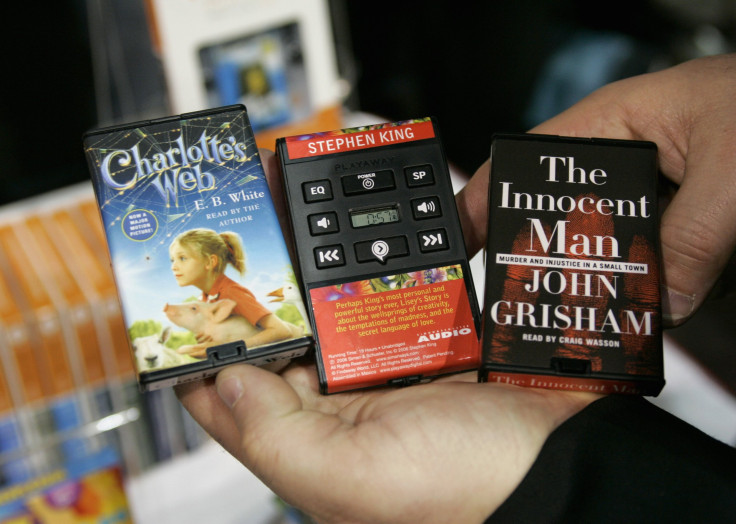Free Audiobooks: Audible, Community Websites Enable Readers To Download And Listen To More Popular Books Than Ever

After years of being relegated to dusty library shelves and jammed into car tape decks, audiobooks have found a new home online, where business is surging and even lifelong readers are discovering new ways to enjoy books they never would have otherwise had time for.
Unlike sales of printed book, which have slowly declined in recent years with the dawn of e-readers, audiobooks sales are expected to grow by 17 percent annually over the next four years. If true, that prediction, made earlier this month by IBIS World research, will surpass the $1.6 billion audiobook publishers reaped between 2008 and 2013.
There are a variety of obvious reasons for the sudden growth, with more Americans becoming increasingly comfortable with mobile devices that make it possible to upload books to a phone and enjoy it during commutes or while doing the dishes. Audiobooks also open up the world of reading to people who would never consider reading before: Readers throughout the Internet have compared the excitement that comes with discovering a new book series to the feeling that comes with watching serialized TV dramas.
Yet another factor overlooked in the conversation has been the sheer accessibility audiobooks offer. TV and movie fans can only spend so much time on HBO and Netflix (NASDAQ: NFLX) or at the movie theater, while thousands of audiobooks are available online for free. Just beneath customers of Audible and Amazon (NASDAQ: AMZN) an emerging subculture of book lovers who have figured out new ways to share their favorite mysteries, biographies and epic zombie adventures without ever paying a cent.
“It’s one of the few times in history that technology has reinvigorated an art form rather than crushing it,” Max Brooks, author of “World War Z,” told the Wall Street Journal of the Internet as a new avenue for books. “Now, because there is such demand and the production value is so inexpensive, it opens the door for more creative storytelling.”
Open Culture, the educational website that frequently posts concert videos and language lessons, for instance, has compiled a list of 550 free audiobooks and short stories culled from throughout the Internet. Much of the selection is made of classic books (including choice works by Charles Dickens, Edgar Allan Poe and H.G. Wells) that are available to be shared because of expired copyright licenses. But there’s also a swath of big name modern authors -- Neil Gaiman and Joyce Carol Oates, for example -- whose stories have appeared on podcasts or YouTube, allowing Open Culture editors to re-post the file.
A common complaint about audiobooks is that they’re just so expensive. A single popular title on Audible can range from $20 to close to $50, with an annual subscription to the website costing $149.50 for 12 books at once or $229.50 for 24 books at once. When considering how much it costs to secure the rights to a book, pay a narrator, engineer, and shell out production costs, that price doesn’t seem as bad.
However, many readers have avoided digging into their wallets by signing up for LibriVox.org. Upon visiting the site users can choose if they’d like to browse the selection of audiobooks or join the network of volunteers who record themselves reading at no cost to other users on the site. LibriVox is also partners with the Gutenberg Project, one of the oldest and most reliable places online for audiobooks.
Local libraries also offer a huge selection of audiobooks. The story may come in a CD format that forces the user to carry home dozens of discs and upload them onto his or her computer, but the only thing separating someone from enjoying a virtually unlimited number of books by famous authors for free is a library card.
Another challenge is overcoming the literature snobbery that permeates high-brow outlets like the New York Times’ parenting blog and elsewhere.
“We’re moving toward a media-agnostic consumer who doesn’t think of the difference between textual and visual auditory experience,” Don Katz, Audible’s founder and CEO, told the Journal. “It’s the story, and it is there for you in the way you want it.”
© Copyright IBTimes 2024. All rights reserved.





















